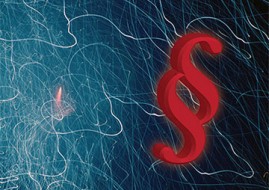What Do You Mean, I Don’t Get Paid? Fee Forfeiture in New York
By Ronald C. Minkoff [Originally published in NYPRR March 2003]
Lawyers who are guilty of professional misconduct have much to worry about. They can be sued for malpractice. They can be disqualified from handling a particular case. They can be sanctioned, or even subjected to professional discipline. But there is another penalty that some may feel strikes the hardest blow of all: fee forfeiture.
Although long established in New York, fee forfeiture remains a well-kept secret. Forfeiture requests occur far less frequently than motions for sanctions or disqualification, and forfeiture law is far less developed. Indeed, as this article will show, while fee forfeiture remains a potent weapon in clear cases (and even in cases that are not so clear), at its margins the doctrine is confused, with decisions on the books that support every possible position.
Basics of Fee Forfeiture
Fee forfeiture can arise in many contexts: as a basis for a client’s refusal to pay a lawyer fired for cause; as a ground for refusing to allow outstanding fees to offset a malpractice judgment; as a defense to a lawyer’s claim for fees; and, most commonly, as a remedy in a client’s lawsuit for breach of fiduciary duty. However it arises, fee forfeiture is solidly grounded in principles of agency law. As the New York Court of Appeals stated in 1886: “An agent is held to uberrima fides in his dealings with his principal, and if he acts adversely to his employer in any part of the transaction… it amounts to such a fraud upon the principal, as to forfeit any rights to compensation for services.” [Murray v. Beard, 102 N.Y. 505, 508 (1886); see Restatement (Second) of Agency §469 (1958), an agent who breaches his duty “is not entitled to compensation even for properly performed services for which no compensation is apportioned.”]
The attorney-client relationship, as a species of agency, is covered by the same basic rule. [See, Campagnola v. Mullholland, Minion & Roe, 76 N.Y.2d 38, 44, 556 N.Y.S.2d 239, 242 (1990), the rule that an attorney fired for cause may not receive fees is “well-calculated to promote public confidence in the members of an honorable profession whose relation to their clients is personal and confidential” (citation omitted); see also, Restatement of the Law Governing Lawyers, §37, comment b, “The remedy of fee forfeiture presupposes that a lawyer’s clear and serious violation of a duty to a client destroys or seriously impairs the client lawyer relationship and thereby the justification for the client’s claim of fees.”]
At their core, the New York rules of fee forfeiture are simple and clear. “An attorney who engages in misconduct by violating the Disciplinary Rules is not entitled to legal fees for any services rendered.” [Shelton v. Shelton, 151 A.D.2d 659, 542 N.Y.S. 2d 719, 720 (2d Dept. 1989).] Thus, lawyers have forfeited their fees in each of the following circumstances:
• When they had a conflict of interest [see, e.g., Matter of Winston, 214 A.D.2d 677, 677, 625 N.Y.S.2d 927, 927-28 (2d Dept. 1995)];
• When they violated the “attorney-witness” rule of DR 5-102 [Brill v. Friends World College, 133 A.D.2d 729, 730, 520 N.Y.S.2d 160, 160 (2d Dept. 1987)];
• When they violated the “no contact” rule of DR 7-104 (A)(1) [Estate of Satin, 265 A.D.2d 330, 330, 696 N.Y.S.2d 223, 224 (2d Dept. 1999)]; and
• When they stole funds placed with them for safekeeping [Estate of Stuart, 261 A.D.2d 550, 550, 690 N.Y.S.2d 644, 645 (1999)].
Similarly, in the malpractice area, the Court of Appeals has ruled that a lawyer who commits malpractice “that results in the client’s loss of recovery upon a valid claim” forfeits any right to offset her unpaid contingent compensation against the award. [Campagnola, 76 N.Y.2d at 44, 556 N.Y.S.2d at 242.] “The attorney’s malpractice,” the Court held, “constitutes a failure to honor faithfully the fidelity owed to the client and to discharge competently the responsibilities flowing from the engagement.” [Id.] But the Campagnola court was careful to limit its ruling to a situation in which the attorneys “performed absolutely no services in connection with the disputed claim, and thus, even if discharged by plaintiff without cause, would not have been entitled to any quantum meruit compensation.” [Id.]
Fee Forfeiture at Margins
As the Campagnola limitation makes clear, the core principles underlying fee forfeiture are not always easy to apply. We will address two areas in New York law which remains cloudy.
1. Does the miscreant lawyer forfeit all fees? For many years, New York courts have struggled with the question whether a lawyer who commits misconduct forfeits all the fees on the matter, or only those fees arising or accrued in connection with, or during the period of, the misconduct. State court decisions are hopelessly split on this point. On the side of complete forfeiture, we have such cases as Estate of Satin [265 A.D.2d at 330, 696 N.Y.S.2d at 224], attorney who violates Disciplinary Rules “is not entitled to legal fees for any services rendered” (citation omitted); and Petronieri v. Talasco [11 A.D.2d 694, 695, 204 N.Y.S.2d 613, 614 (2d Dept. 1960)], lawyer who failed to press case forward with “reasonable diligence… is not entitled to any compensation.”
On the other side, we have examples like Matter of Winston [214 A.D.2d at 678, 625 N.Y.S.2d at 927-28], while firm not entitled to compensation for work done after date that law firm knew of conflict, question of fact exists as to whether firm should be paid for prior work; and A to Z Associates v. Cooper [161 Misc. 2d 283, 293, 613 N.Y.S.2d 512, 520 (Sup. Ct. N.Y. Co. 1993)], attorneys not entitled to be paid “only during the period of their disloyalty.”
On the other hand, federal courts in New York have clearly and repeatedly limited the scope of forfeiture to fees accrued either in connection with or during the period of the misconduct. [See, e.g., Musico v. Champion Credit Corp., 764 F.2d 102, 113 (2d Cir. 1985), limiting forfeiture to those tasks in which attorney engaged in misconduct; see also, Ianotti v. Manufacturers Hanover Trust Co., 567 F.2d 166, 180-81 (2d Cir. 1977), fee forfeiture limited because, inter alia, attorney had, prior to the breach, performed valuable work for the estate.] Even for the time or task for which fees are forfeited, the federal courts have not automatically imposed blanket forfeiture, but have based the amount of the reduction on factors such as whether or not the misconduct was willful, the nature of the misconduct, the value of the services, and the harm to the client. [See, Mar Oil, S.A. v. Morrissey, 982 F.2d 830, 840 (2d Cir. 1993), “under New York law, attorneys may be entitled to recover for their services, even if they have breached their fiduciary obligations;” Silbiger v. Prudence Bonds Corp., 180 F.2d 917, 921 (2d Cir. 1950), attorney with conflict of interest in reorganization proceeding did not forfeit all fees because client has trustee available to protect its interest; see also, Restatement of Law Governing Lawyers, §37, listing relevant factors.]
2. Does the client have to suffer actual harm? Unlike courts in other states, New York courts have not confronted this issue directly. [See, Burrow v. Arce, 997 S.W.2d 229 (Sup. Ct. Texas 1999), client need not suffer actual harm.]
New York decisions which do address the issue suggest that injury to the client is not a necessary element of fee forfeiture. [See, e.g., Dagny Mgmt. Corp. v. Oppenheim & Meltzer, 199 A.D.2d 711, 713, 606 N.Y.S.2d 337, 339 (3d Dept. 1993), counsel’s unethical actions during settlement negotiations deemed ground for fee forfeiture, even though ultimate settlement unaffected; see also, Petronieri v. Talasco, supra, counsel forfeits fees for failing to pursue case diligently, although client’s claim was preserved and settled favorably.]
Client harm is just one of several factors that courts consider in determining whether fees will be forfeited. Compare, Dagny Mgmt., supra, although client suffered no harm, fact that attorney intentionally interfered with client’s fundamental right to settle case on his own, and did so in order to further attorney’s own interests, results in fee forfeiture, with Rubinstein & Rubinstein v. Papadakos, [31 A.D.2d 615, 295 N.Y.S.2d 876 (1st Dept. 1968)], attorney’s failure to pass along settlement offer not deemed grounds for forfeiture where client admitted he would not have accepted the offer.
Although its precise limits in New York are still undefined, a claim for fee forfeiture remains a troublesome consequence for lawyers who misstep and a valuable tool for those New York attorneys savvy enough to use it.
Ronald C. Minkoff is a member of Frankfurt Kurnit Klein & Selz, P.C. in New York City, where he practices commercial litigation and the law of lawyering. He is also an Adjunct Professor of Professional Responsibility at Brooklyn Law School.
DISCLAIMER: This article provides general coverage of its subject area and is presented to the reader for informational purposes only with the understanding that the laws governing legal ethics and professional responsibility are always changing. The information in this article is not a substitute for legal advice and may not be suitable in a particular situation. Consult your attorney for legal advice. New York Legal Ethics Reporter provides this article with the understanding that neither New York Legal Ethics Reporter LLC, nor Frankfurt Kurnit Klein & Selz, nor Hofstra University, nor their representatives, nor any of the authors are engaged herein in rendering legal advice. New York Legal Ethics Reporter LLC, Frankfurt Kurnit Klein & Selz, Hofstra University, their representatives, and the authors shall not be liable for any damages resulting from any error, inaccuracy, or omission.
Related Posts
« Researching Ethics Issues — List of Sources Second Circuit Orders Discovery on Debt Collection Practices »













